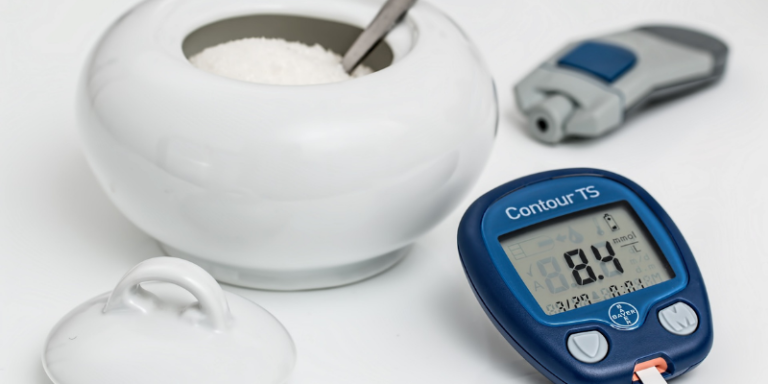What is Blood Sugar
Blood sugar or glucose, is the main sugar that is found in the blood according to livescience.com. The body gets glucose from the foods that we eat, it then turns the glucose into energy and also provides nutrients to the body’s organs, muscles and nervous system.
How Does Your Blood Sugar Levels Affect Your Weight?
Every time you eat, your pancreas produces insulin. This hormone helps your body harness the energy provided by food by “unlocking” your cells, helping to move sugar (aka glucose) inside each one, where it’s used for fuel.
The problem starts with insulin resistance, in which your cells no longer respond to the hormone. Weight gain can bring it on, especially if you add visceral fat (the kind around your abdominal organs) because it churns out inflammatory chemicals that harm cells’ response to insulin (health.com).
Blood Sugar Disorders
Blood sugar disorders are increasingly common in the modern world, and they take a significant toll on our health. Both high and low blood sugar have many of the same causes and are treated very similarly.
Balancing Blood Sugar for Optimal Health
Adjust Carbohydrate Intake:
Those with blood sugar disorders may need to limit their carbohydrate intake. The best way to determine how much carbohydrate you can tolerate is by tracking your pre- and post-meal blood sugar with a device called a glucometer.
Eat More Protein:
Higher protein diets have a stabilizing effect on blood sugar. Aim for between 25 and 30 percent of total calories from protein, or approximately 125 to 150 grams per day on a 2,000-calorie diet.
Eat Fermented Foods and Fermentable Fibers:
Poor gut health contributes to poor metabolic health. Be sure to eat plenty of fermented foods, like sauerkraut, yogurt, kimchi, kefir, or kombucha on a regular basis to maintain a healthy gut. You’ll also want to eat a diet rich in fermentable fibers—these are fibers that help to feed your gut bacteria and are present in starchy and non-starchy vegetables. Resistant starch is also particularly useful for improving insulin sensitivity. You can supplement with unmodified potato starch, a source of resistant starch, by consuming three to four tablespoons of it daily mixed with water or added to other foods. Other sources of resistant starch include white potatoes (cooked and then cooled for 24 hours), unripe bananas, tapioca flour, or dehydrated green (unripe) plantains.
Alter Your Food Intake Timing:
If you have high blood sugar, you may notice improved blood sugar control when you fast intermittently. Intermittent fasting involves skipping a meal, typically breakfast, and can sometimes include extended periods of fasting. You’ll also want to avoid snacking, as snacking can worsen blood sugar control in those with high blood sugar.
If you have low blood sugar, you’ll want to eat every two to three hours. As a general rule, don’t go more than three hours without something to eat. You can choose to incorporate this into your life as three meals with snacks in between, or if you prefer, six smaller meals throughout the day. You’ll also want to make sure you eat breakfast within 30 minutes of waking up, and include at least 30 grams of protein during breakfast. Lastly, those with low blood sugar often do well with a snack before bed, as this can help stabilize blood sugar overnight and help prevent sleep disruptions.
Physical Activity:
It is important to move throughout the day in addition to getting regular exercise. This means standing (perhaps using a standing or treadmill desk), walking, using the stairs, and just overall being more active in your everyday life. You should aim for about 10,000 steps per day through your activity. It is also important to aim for 150 minutes of moderate intensity activity per week (e.g., jogging, yoga, dancing), or 75 minutes of vigorous activity (e.g., running, Zumba, playing sports), or 30 sets of highest-intensity exercise per week (e.g., sprinting, jumping rope, resistance training), or some combination of the above. A combination of aerobic exercise and strength training is superior to either type of exercise alone for improving blood sugar control.
Sleep:
Sleep deprivation can lead to insulin resistance and poor blood sugar control. Make sleep a priority by giving yourself enough time to sleep and practicing good sleep hygiene by avoiding blue light at night, using blackout shades or an eye mask, and getting sun exposure in the morning when you wake up.
Stress management:
Chronic stress reduces blood sugar control, promotes inflammation, and leads to low levels of cortisol, which can disrupt blood sugar control. While the benefits of stress management can take longer to manifest than the other recommendations listed here, they are worth the wait! Practice meditation, tai chi, yoga, deep breathing, etc., on a daily basis to help control your blood sugar.
Getting Started
Small efforts and changes in your diet and lifestyle will help to regulate your blood sugar levels for optimal health. If you currently struggle with blood sugar imbalance or other metabolic issues, consult with your doctor or health professional or give our office a call in order to set up a treatment plan specific to your body and needs.

Reader Interactions